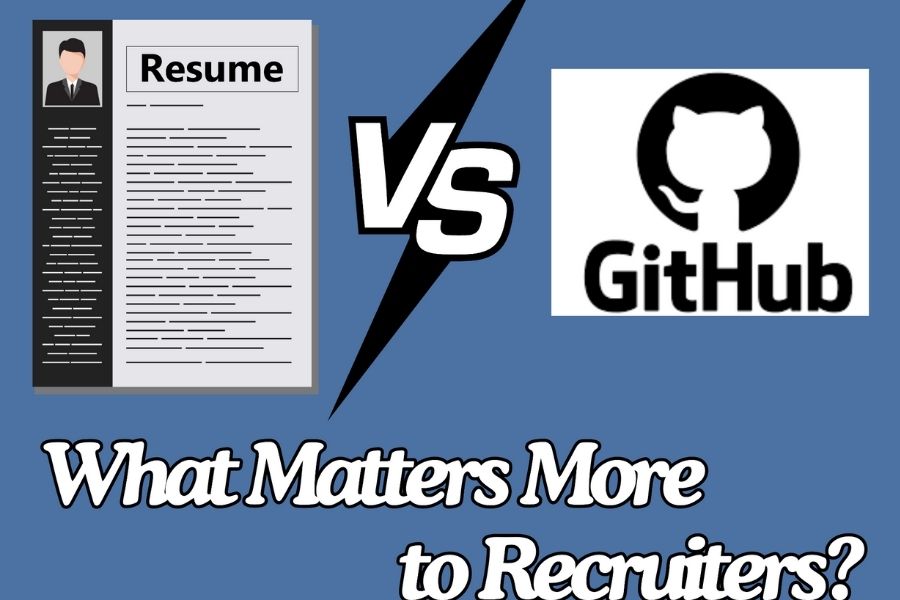Consider a situation when you think you have spotted a great tech job. The representative will already request your CV, but along with it, they would like to have a link to your GitHub. Which do you consider more significant? In today’s digital era, having an eye-catching resume and a solid GitHub portfolio is enough to either make or break your job interview.
Still, have you ever thought about why the recruiter is more interested in these? Can the old-fashioned resume with a work history still work, or will a GitHub with the latest projects now be more sought after? Students and employees (both newly-qualified and experienced ones) should have the initiative to acquire more new skills that will later lead to a better professional career.
For Indian students and professionals, this matter is central. As the IT sector is making its way to the top, the importance of startups and remote work culture has also increased. Therefore, you should now know what the best fits out of those are!
Resume vs. GitHub: What Matters More to Recruiters?
A resume is a document where your skills, experience, and qualifications are systematized and characterized for the recruiters. This is the initial impression that you want to give to the company.
GitHub, on the other hand, is a platform where developers can showcase their coding expertise, participate in projects, and have well-organized documentation of work done. It is evidence of the practical acquisition of competencies.
But which is the most favorable way to gain a job? Let’s distinguish them within the specified situations and test their validity.
Key Differences: Resume vs. GitHub
| Feature | Resume | GitHub |
| Purpose | Condense the education, job history, and special skills | Implement programming knowledge through real projects |
| Format | One or two-page document | A virtual warehouse with the source code furnished by the developer |
| Importance for Non-Tech Roles | Highly crucial | Less relevant |
| Importance for Developers | Important but secondary | Critical for demonstrating expertise |
| Recruiter Preference | Used for shortlisting candidates | Used for assessing coding ability |
| Customization | Specific for each job application | Git is publicly availability and it also shows the growth and fixes that have been done to it |
| Evaluation Criteria | The experience, education, and skills will be checked | The coder’s quality, project’s complexity, and activity’s frequency will be decided |
The Role of Resume in Landing a Job
The resume is the first and most formal document that the recruiters have ever received from you. Here’s why it matters:
- First Screening: ATS is a computerized system used to filter out applications with irrelevant keywords for a particular job.
- Professionalism: A well-crafted resume not only shows your communication skills but also indicates your professional trajectory and how much you know about the sector.
- Essential for Non-Developers: If you are targeting project management, UX/UI, or business jobs, you have to pay more attention to resumes than the GitHub profile.
When Does a Resume Hold More Weight?
- Using online sources (e.g., Naukri, LinkedIn, Indeed) for applying
- For roles in business, management, or consulting
- When required by traditional companies or MNCs
- For someone who is experienced but doesn’t have coding experience
The Role of GitHub in a Tech Career
GitHub is an interactive word resume for software developers. This would be a great way to show the recruiters your coding trials. Here’s why it’s crucial:
- Creates Real-life Skills: Your coding practice, efficiency, and problem-solving capabilities are measurable skills that recruiters can judge.
- Open-Source Contributions: The deliberate placement of contributions to projects can put you in a different position when compared with competitors.
- Real-World Evidence: We get the opposite of just a simple list of skills when it comes to GitHub. Here, one can see an account which is the evidence of the well done work.
Conclusion
In the debate between resume vs. GitHub, the answer isn’t one-size-fits-all. While a resume remains the gateway to landing an interview, GitHub provides tangible proof of your skills, particularly for developers. For tech professionals, having both a well-structured resume and an active GitHub portfolio increases your chances of standing out in a competitive job market.
At Polaris School of Technology, we equip students with the technical expertise and hands-on experience needed to build an impressive GitHub portfolio while also guiding them in crafting professional resumes that capture recruiter attention. Our industry-driven B.Tech program ensures you’re job-ready with the right balance of theoretical knowledge and practical application.
Take the next step in your tech career today! Enroll at Best online coding courses and build future-ready skills.
FAQs
1. Is it possible to have a job based solely on a GitHub profile without a resume?
Not even a little bit. Although GitHub reflects skills, it is important to mention the resume as well because HR standards are obligatory. Moreover, a resume is the first step for shortlisting.
2. How do recruiters assess GitHub profiles?
They look at the quality of the coding, the difficulty of the project, the frequency of the contributions, and the extent of the open-source code collaboration.
3. Are freshers supposed to concentrate more on GitHub or a resume?
If you really want to succeed, focus on both in an equal quantity so that you get practical skills and prove them on your resume, too. Otherwise, your career chances might be severely diminished.
4. Is GitHub required for non-coding positions?
No. GitHub is mainly restricted to software-related jobs. The rest are more concerned with well-structured resumes and a professional LinkedIn profile.




